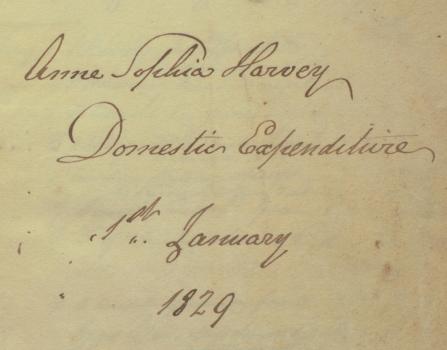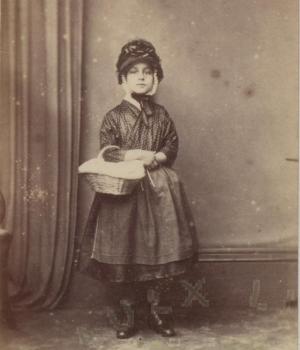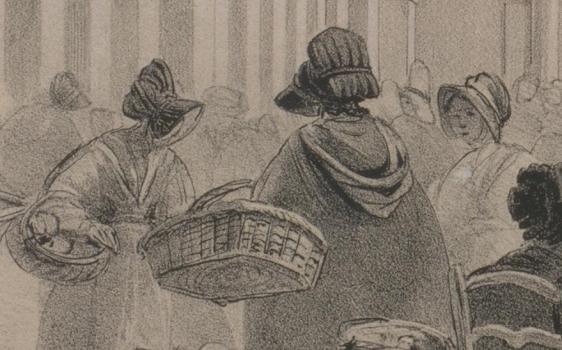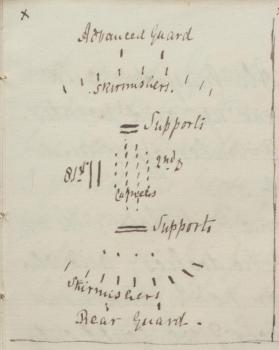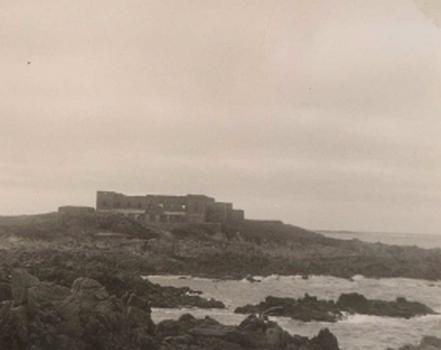16th December 2015
From Anne Sophia Harvey's account book (brown leather), Domestic Expenditure, [from] 1 January 1829, part of Library's extensive Harvey Collection. Anne Sophia Grut (1802-1844) was daughter of Peter Grut and Anne Collings, and married John Harvey. This account book ends in December 1834. A second account book, Anne Sophia Harvey's Household Expenditure, 1 July 1838, ends in December 1842.
15th December 2015
Kindergarten Christmas shows, from the Harvey family collection, recorded in Aunt Loo's Account of the Children, in blue Writing Album. The photograph, by C L Bienvenu of Cordier Hill, is of Elise Mauger, aged '9 years, daughter of HM's Sheriff of Guernsey. In fancy costume, 'The old Guernsey woman,' worn by Edith M Harvey at the Ladies' College Kindergarten cantata, 19th December 1896. Given to Miss Harvey by Mrs H D Mauger.' Winifred Harvey was very badly affected by asthma as a child, and missed long periods of schooling as a result. The Writing Album also contains programmes for the 1893 and 1894 performances, as well as a Matinée musicale of May 19, 1896.
15th December 2015
From Anne Sophia Harvey's account books Domestic Expenditure, [from] 1 January 1829 (brown leather), and Anne Sophia Harvey's Household Expenditure, 1 July 1838, which ends in December 1842, part of Library's extensive Harvey Collection. Anne Sophia Grut (1802-1844) was daughter of Peter Grut and Anne Collings, and married John Harvey. The illustration is a detail from a 'Moss' print of 1841, Market Place, Guernsey, in the Library Collection.
6th November 2015
From Major Harry Harvey of the King's Own Borderers' Afghan Letters, in the Library. His letters were copied by his sisters into notebooks. The schematic above accompanies this letter and next to it is noted: 'This formation kept off the tribes of whom there were hundreds on the hills. They were afraid to attack. HH.'
8th October 2015
From the Gazette de Guernesey, 16 February 1850. 'We thought it would be useful to list here, for the benefit of our readers, those forts and fortresses, built by the States for the defence of this Island in time of war, which have been handed over to the Government, as very few people are aware of them all.' The photograph is of Fort Hommet, by S M Henry, in the Library Collection. For further details on the individual sites see the Billet d'Etat for March 1908 in the Library Collection.
7th October 2015
A translation of George Métivier's dictionary entry for Guernsey's dread black dog, or Tchîco, p. 461. [By Dinah Bott]
28th September 2015
By the writer and prolific journalist, Basil Campbell de Guérin. From The Scots Magazine, XLVIII (5), February 1948, in his Scrapbook H, in the Library. Although this is a fascinating article, the premiss upon which De Guérin wrote it is fundamentally flawed; the 92nd Foot did not become the Gordon Highlanders until 1798. This version of the 92nd Regiment was raised in Ireland by George Hewett on 31 December 1793. Also known from October 1794 as Colonel Hewitt's Regiment of Foot, it lasted less than two years, until it was disbanded in October 1795.
22nd September 2015
From The Law Magazine and Law Review, or Quarterly Journal of Jurisprudence, May-August 1859, pp. 23 ff. Probably a comment on the reaction in Government circles to the Commissioners' Report of 1848, it also happens to provide a helpful explanation of the distribution of landed property and rentes in Guernsey. 'When the right and power is preserved among a free people of regulating their own legal and social customs, the habit of self-government thus engendered generally saves their country from the anomaly and inconvenience of the institutions and procedure being immediately at variance with the wants and character of the people.'
9th September 2015
First annual meeting.
26th August 2015
Correspondence on local and family history from the Edith Carey collection.

